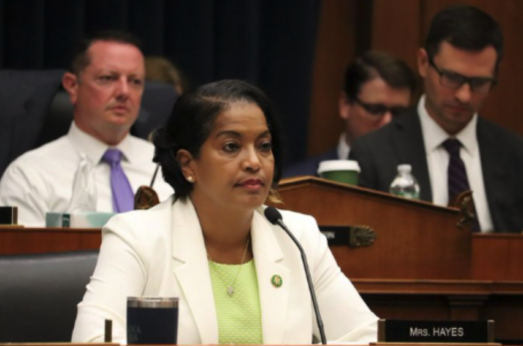
WASHINGTON (PAI)—The right-wing Republican chair of a House subcommittee that deals with labor law led off the panel’s sixth anti-worker hearing in the current Congress—and the second in a month—with a long rant against the National Labor Relations Board.
The title of the June 12 House Health, Employment, Labor, and Pensions Subcommittee hearing gave the game away. Republicans called it to investigate, as its headline said, “NLRB overreach and union bias.” They followed with a nasty lead tweet: “Unions are like a bad habit: Easy to get into, hard to get rid of.”
Panel chair Robert Good, R-Va., spent the hearing bashing the board’s top enforcement officer, General Counsel Jennifer Abruzzo. The three Republican boss-side labor law attorneys called as GOP witnesses joined in. One, John Ring, chaired the board under the Republican Trump government.
As usual, the committee did not call on the NLRB to defend itself. That left veteran San Francisco pro-worker attorney Eileen Goldsmith and the panel’s out-talked Democrats to defend both the board and Abruzzo, a former top counsel for the Communications Workers.
“The right to organize has been the law of the land for nearly a century,” replied Rep. Jahana Hayes, D-Conn., a National Education Association member and former National Teacher of The Year.

“The benefits for union-busting outweigh the penalties,” Hayes continued. “Without a source of income, they (workers) may suffer additional harms.” Responded Goldsmith: “It might be years after the fact” before the workers see justice and income “will also be reduced based on whatever they earned in the meantime.”
Like his god, Republican presidential nominee Donald Trump, Good, who also chairs the Trumpite ultra-rightist House “Freedom Caucus,” either got his facts wrong—he said “real wages are decreasing”—or didn’t let facts get in the way of his opinions.
An example: Good declared unions “a tired, outdated remnant of yesteryear” despite record popular support of 68% in public polls and a 66% increase in union recognition petitions in fiscal 2022-23 combined, which ended last September 30.
The other Republican lawmakers were milder. One exception: Rep. Tim Walberg, R-Mich., who dragged the college student protests against Israel, as a result of the ongoing Israeli war against Gaza, into the fray. Walberg, citing a right-wing slanted Wall Street Journal editorial, charged the board with enabling unions to organize on campuses, raising tensions and anti-Semitism.
The attorneys particularly went after the board’s new joint-employer rule, which holds both a local franchise—say, a McDonald’s restaurant—and corporate headquarters, which at McDonald’s governs everything from uniforms to sizes of hamburgers, jointly responsible for obeying or breaking labor law.
And they also slammed the board’s recent Cemex decision which reaffirms employers can agree to card-check recognition of the union if a majority of workers sign union election authorization cards, or choose an election as an alternative.
They also criticized a board ruling and an Abruzzo memo that says workers illegally wronged by bosses’ labor law-breaking should be fully compensated for their losses. That means not just net back pay, but also forcing employers to repay workers for expenses and losses they suffered—everything from high credit card charges to shelling out cash for medical care—while awaiting justice.
The Republican lawyers barely touched that issue. They concentrated their fire on NLRB’s case backlog and what they called its attempts to expand labor law. “Seeking to promote a particular agenda, the current board majority and the NLRB General Counsel are attempting to administratively rewrite” the law “to facilitate unionization at the expense of individual employee rights and employer interests,” Ring charged.
“We reinstated many established, foundational precedents, including the board’s enforcement of employer policies, employer property rights, and other workplace practices,” Ring claimed. He carefully dodged the many cases pro-worker attorney Goldsmith cited where the Trump-named board majority tossed decades of precedents in favor of imposing their ideology.
“The board issued these decisions as an end-run around congressional authority to achieve the same legislative results,” claimed management-side attorney Alice Stock.
“The NLRB clearly overreached its authority. Substantively, the agenda is to eliminate secret ballot elections, thus depriving employees of their right to free choice in the selection of a bargaining representative, and to narrow or eliminate employer free speech and property rights.”
Though NLRB General Counsel Abruzzo didn’t get a chance to defend herself before the hostile Republicans, she went to bat for her agency, her staff, herself, and the law at a Zoom session the day before, sponsored by the Economic Policy Institute.
“We enforce a pro-worker statute that attempts to level the playing field” between workers and management, Abruzzo said. “The National Labor Relations Act says it is the policy of the United States to encourage collective bargaining and protect workers’ rights.”
And she defended “the meaningful remedies” instituted which give workers more than just net back pay when they finally win an NLRB case. They’re particularly needed “in that fragile time” for workers between winning a recognition election and achieving a first contract.
Not all of her initiatives have borne fruit. Abruzzo advocates curbs on “captive audience meetings,” closed-door mandatory sessions where bosses and their union-busters can and do lie about unions and often break labor law through their outright threats to stop organizing drives.
Several states, including New York, California and Minnesota—Illinois is next—ban bosses from penalizing workers who refuse to attend such propaganda sessions. Abruzzo’s trying to get the board to crack down on the penalties “but it hasn’t agreed to that yet.”
We hope you appreciated this article. At People’s World, we believe news and information should be free and accessible to all, but we need your help. Our journalism is free of corporate influence and paywalls because we are totally reader-supported. Only you, our readers and supporters, make this possible. If you enjoy reading People’s World and the stories we bring you, please support our work by donating or becoming a monthly sustainer today. Thank you!










